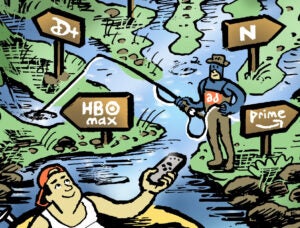 Here’s today’s AdExchanger.com news round-up… Want it by email? Sign-up here.
Here’s today’s AdExchanger.com news round-up… Want it by email? Sign-up here.
Pubs Plug Facebook Leaks
Publishers and retailers are quietly rejecting the Facebook code that tracks users across the internet, the WSJ’s Reed Albergotti reports. Web traffic experts at Ghostery told the Journal that since the spring, they’ve seen Facebook’s code less often on sites like The New York Times, Airbnb, Williams-Sonoma and A&F. Ghostery CEO Scott Meyer said it could be that publishers and retailers want to restrict Facebook’s access to their data. “[Online publishers are] sharing their entire audience back to Facebook and what are they getting for it? I can pretty much guarantee that the value publishers are getting from that is not worth it,” added John Strabley, director of strategy for Quaero. More.
Northern Migration
Mirroring a similar move in July, when AOL UK automated its reserved inventory, AOL Canada made 100% of its display, video and mobile inventory available to Canadian advertisers for purchase programmatically on Wednesday. Accuen is a launch partner and will manage inventory sale, which includes premium formats, across AOL’s owned and operated Canadian sites, including The Huffington Post Canada, Autoblog Canada, and StyleList Canada. What’s more, AOL added a premium mobile unit to its programmatic lineup earlier this month. Programmatic’s making waves, eh? Read the press release.
Native Juices Flowing
Juice, a mobile-only monetization company, is joining forces with Twitter to offer programmatic native app advertising through the MoPub exchange. “Native can be kind of clunky, and when brands get into the nitty gritty of what’s actually necessary to do it, there’s not a whole lot of efficiency,” CEO and President Neil Sweeney told AdExchanger. “We’re doing this because it’s programmatic and not a make-work manual process.” Two brands have already signed up for the service, with several others on the way. Read the release.
Search Engine Success
Online survey company Qualtrics just raised a notable $150 million in venture capital, which CEO Ryan Smith said the company will use to expand overseas. Qualtrics’ clients include MasterCard, Kellogg’s, Southwest Air, Lands’ End and the Weather Channel, and the company touts “fast data” in the name of real-time decisioning. Go here for the press release and read an AdExchanger Qualtrics case study.
You’re Hired!
But Wait. There’s More!
- This Technology’s ‘Congruity’ Keeps Ad Insertion In Check – Multichannel
- Marketo Teams With Turn For Scalable CRM – ZDNet
- Performance Horizon Group Closes $10M Series B Round – press release
- Skyhook Adds Tech For Location-Targeted Content – BetaBoston
- IAB’s Definition Of Illegitimate Activity In Anti-Fraud Principles Needs Clarification – ClickZ
- ExtendTV Extends Programmatic Video To Local Advertisers – MediaPost












